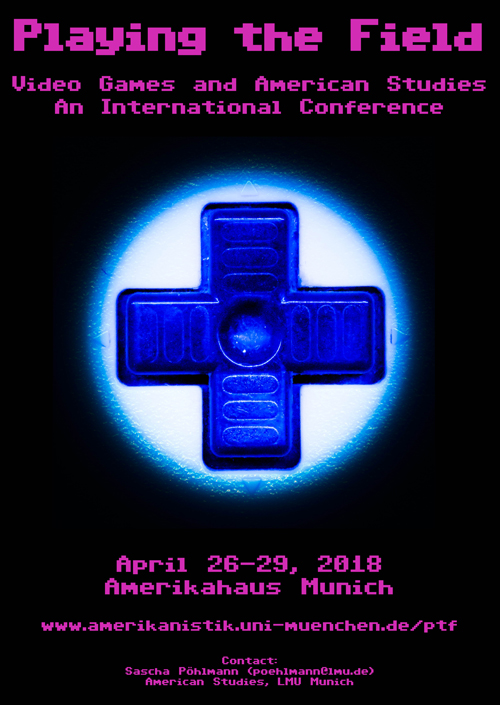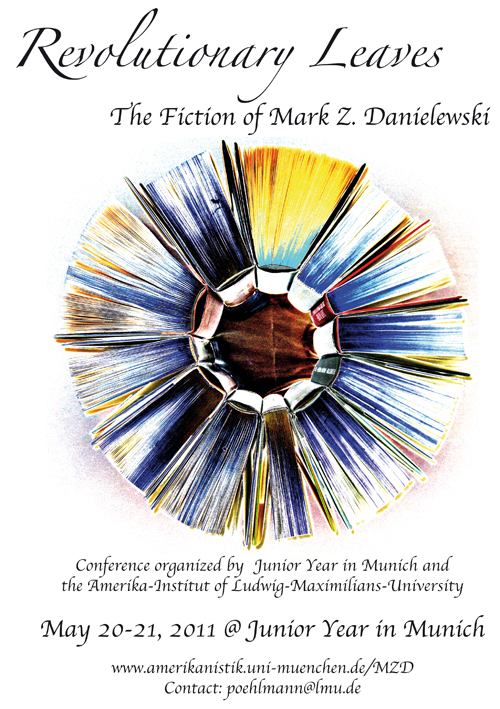Ältere Konferenzen
"Art of Protest" in Lisbon
November 23.-24., 2018 at the Nova University, Lisbon
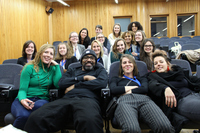 A group of ten BA and MA Students of LMU Munich’s American Studies program participated in an international conference at Nova University in Lisbon in November, 23/24, 2019. At the conference, “Dikes of Courage: Martin Luther King, the Civil Rights Movement, and the Aesthetics of Protest,” they presented papers in two student panels on "#BlackLivesMatter and the Aesthetics of Protest.” Their papers analyzed the representations of the Black Lives Matter movement in different media and art forms: music, theatre, visual arts, and television.
A group of ten BA and MA Students of LMU Munich’s American Studies program participated in an international conference at Nova University in Lisbon in November, 23/24, 2019. At the conference, “Dikes of Courage: Martin Luther King, the Civil Rights Movement, and the Aesthetics of Protest,” they presented papers in two student panels on "#BlackLivesMatter and the Aesthetics of Protest.” Their papers analyzed the representations of the Black Lives Matter movement in different media and art forms: music, theatre, visual arts, and television.
Here’s a report on their participation at the conference!
Also check out the students blog LMU goes Lisbon
Internationale Tagung "Wie wir lesen"
22.-23. Juni 2018 im Literaturhaus München

Angesichts der globalen Verbreitung digitaler Medien und der damit einhergehenden ‘Lesemüdigkeit’ mehren sich inzwischen Stimmen, die vom Verlust der sinn- und identitätsstiftenden Funktion des Lesens warnen. Im Zeitalter von Google, Facebook und Instagram, so befürchten sie, lesen wir nicht nur weniger, sondern wir sind dabei, das Lesen überhaupt zu verlernen. Wie sieht die Zukunft des Lesens aus, was denken und fühlen wir, wenn wir lesen, und wie verändert sich dabei unser Verhältnis zu uns selbst und zu unserer Umgebung? Über diese Fragen diskutieren führende Amerikanisten und internationale Experten aus Universitäten, Wissenschaftsförderung und Feuilletons. Zur Konferenz-Website
Veranstalter: Amerika-Institut der LMU München in Kooperation mit dem Literaturhaus München//gefördert vom Kulturreferat der Landeshauptstadt München//Bayerische Amerika Akademie//Universitätsgesellschaft der LMU
Organisation: Klaus Benesch & Manlio Della Marca (Amerika-Institut der LMU München)
Information und Kontakt: www.literaturhaus-muenchen.de/index.html
Anmeldung und Karten: Der Eintritt für die Tagung ist frei (Anmeldung erforderlich unter: info@literaturhaus-muenchen.de oder Tel. 089-29 19 34-27)
Karten für das Abendevent „Die Kunst des Lesens“ am Freitag sind über die Website des Münchner Literaturhauses erhältlich (Euro 12.- 8.-)
Medienecho:
Süddeutsche Zeitung, 25.6.2018
Playing the Field: Video Games and American Studies
Amerikahaus Munich, April 26-29, 2018
The program is available for download here.
Sponsored by:
Bavarian American Academy
German Association for American Studies
Alumni Association of the Amerika-Institut
The highly diverse field of Video Game Studies has firmly established itself on the academic scene in the last decades as a truly interdisciplinary conglomerate that draws on the discourses of media studies, design, programming, literary and cultural studies, anthropology, philosophy, sociology, and numerous other disciplines without fusing them into a singular streamlined approach. American Studies, an equally diverse discipline in itself, has provided a crucial (if not unproblematic) context in the constitution of Video Game Studies, and while the latter has certainly emancipated itself from any particular dependency, the two fields have now entered a productive dialogue in which they influence and speak to each other rather than struggle for hegemony of interpretation over a particular cultural field. This relationship is both budding and tenuous, as American Studies has only gradually turned its attention to video games even though the medium has grown in the last few decades from a niche phenomenon to a cultural industry that is arguably the most important force in American popular culture today. Yet research on this crucial topic in the institutional framework of American Studies is often either local or even personal, with no substantial wider network for scholars to participate and collaborate in.
This conference set out to change that and provide the first opportunity for scholars in American Studies working on video games to connect, share their research results, workshop their projects, and start building a network that so far exists in separate clusters at best. At the same time, the conference also set out to discuss the particular perspectives that American Studies with its highly diverse toolbox of theoretical and practical approaches may bring to the analysis of video games, and how in turn other approaches to video games (and the games themselves) affect and change these established theories and methods.
Organizer: Sascha Pöhlmann, poehlmann@lmu.de.
Harper Lee: Revisions
International Conference
LMU Munich, June 23-25, 2016
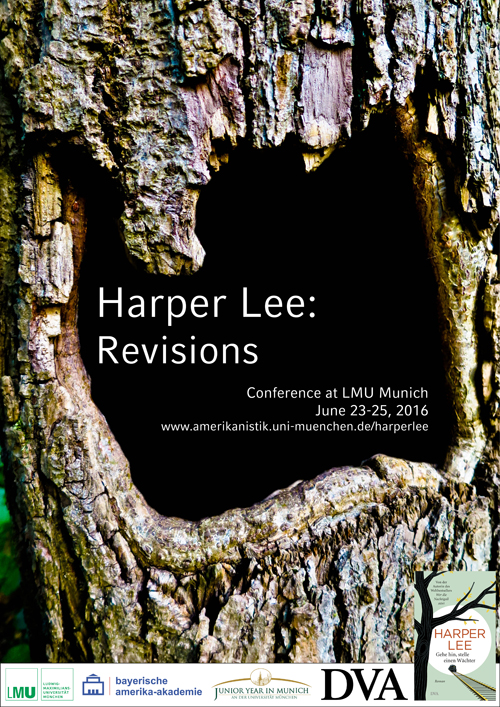
To Kill A Mockingbird, an American literary classic since its publication in 1960, along with the Academy Award-winning film adaptation, holds a unique place in the U.S. cultural imagination. Decades of scholarship analyzing the novel’s literary, cultural, legal, and pedagogical implications confirm its artistic and social relevance. In July 2015, the publication of Harper Lee’s alleged draft, Go Set A Watchman, followed by a wave of articles in the popular press, unsettled the novel’s stable presence in the American literary canon, forcing readers to rethink critical and popular interpretations. In particular, the trial scene, in which Atticus Finch, the white lawyer, defends the falsely accused African American, Tom Robinson, underscored the injustices of racial segregation and continues to evoke patterns of racial discrimination today.
The watershed event of Lee’s second publication, in which Scout, as a young adult, confronts her father’s racism, provoked much speculation and quick interpretations during a short news cycle. We would like to support a thoughtful return to Harper Lee’s work. In sum, we would like to revisit To Kill A Mockingbird in light of Go Set A Watchman, considering how we might address both works in our research and teaching. Together, we will discuss the lasting lessons of To Kill A Mockingbird and its influence in American culture.
Conference Organizers: Amy Mohr and Mark Olival-Bartley. There is no conference fee.
The Eighth Annual International Whitman Week
Seminar and Symposium (July 27 - August 1, 2015)
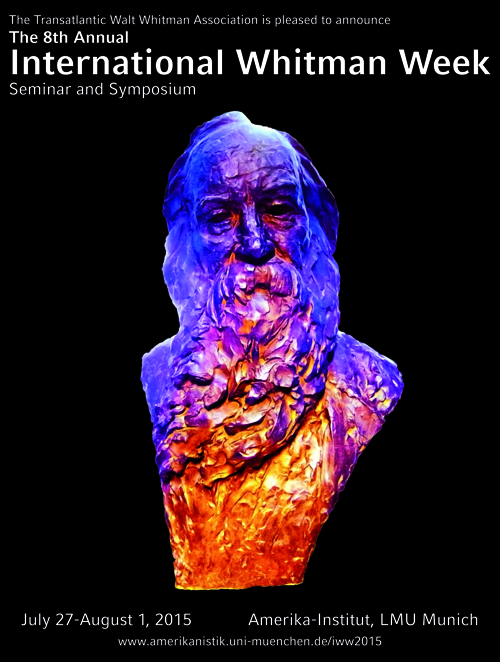
Sponsored by:
Bavarian American Academy
DFG-Graduiertenkolleg "Funktionen des Literarischen in Prozessen der Globalisierung"
Münchener Universitätsgesellschaft
Kulturreferat der Stadt München
Alumni Association of the Amerika-Institut
Organizers: Thoren Opitz (thoren.opitz@gmail.com) and Sascha Pöhlmann (poehlmann@lmu.de)
Founded in Paris in 2007, the Transatlantic Walt Whitman Association (TWWA) invites students, researchers, and Whitman enthusiasts to participate in its 8th annual Whitman Week, consisting of a Seminar for advanced students interested in Whitman and Whitman’s poetry, and a Symposium bringing together international scholars and graduate students. Previous Whitman Weeks have been held at Universität Dortmund, Germany (2008), Université Francois Rabelais, France (2009), Università di Macerata, Italy (2010), Universidade Estadual Paulista, Brazil (2011), Szczecin University, Poland (2012), Northwestern University, USA (2013), and Otto-Friedrich-University Bamberg, Germany (2014). The 2015 events were held at Ludwig-Maximilians-Universität in Munich.
TWWA’s Mission
Walt Whitman’s Leaves of Grass remains a landmark of modern poetry and world literature. Every year new editions of Whitman’s work are published in a variety of languages; an ever- expanding group of poets “reply” to him in their poetry; his poems are set to music and are quoted in films; he is invoked in the discussion of political and cultural issues, as well as of gender and sexuality; and he continues to be a huge presence in college and university curricula globally. In order to respond adequately to this international phenomenon, TWWA sponsors a yearly International Whitman Seminar, during which students from different countries come together for an intensive, credit-bearing Seminar taught by an international team of Whitman specialists.
Seminar Structure
In the morning classes, focusing on some of Whitman’s major poems and selections from his prose, students had an opportunity to confront Whitman’s books, share their readings of key poems and clusters, and discuss Whitman’s attempts at a multilingual English, his cohesive representation of human relations, and his work’s international significance. In addition, there were afternoon workshops on the reception of Whitman in various countries, as well as the translation of his poems into various languages, including German, French, Italian, Spanish, Portuguese, Polish and Asian languages.
Download the program here.
Faculty
The team of international instructors for 2015 were:
Ed Folsom: Professor of American Literature at the University of Iowa; co-director of the online Whitman Archive; editor of the Walt Whitman Quarterly Review; author, co-author and editor of over 20 Whitman-related books, including, most recently, Walt Whitman’s Democratic Vistas: A Facsimile of the Original Edition (2010), Re-Scripting Walt Whitman (2007) co-authored with Kenneth M. Price, Whitman Making Books / Books Making Whitman (2005), and Whitman East and West: New Contexts for Reading Walt Whitman (2002);
Eric Athenot: Professor of American Literature and Translation studies at the Université Paris-Est Créteil (Upec), France. He has carried out the first French translation of the 1855 Leaves of Grass, and he will publish a translation of Whitman's An American Primer and Collect in 2015. He is the author of numerous articles on Whitman and the book Walt Whitman, poète-cosmos. He has taught and given lectures on Whitman all over the world and is one of the founders of the Transatlantic Walt Whitman Association.
Taylor Hagood: Associate Professor of American Literature at Florida Atlantic University; author of “Hair, Feet, Body, and Connectedness in 'Song of Myself'” (Walt Whitman Quarterly Review), “‘Nobody Knows but Me’: Jimmie Rodgers and the Body Politic” (Walking the Line: Country Lyricists and American Culture, ed. Thomas Alan Holmes and Roxanne Harde), and multiple publications on the literature and culture of the US South, African American literature, and the writing of William Faulkner.
Kerstin Schmidt: Professor of English and Chair of American Literature at the Catholic University of Eichstaett, Germany; her second book ms. on “Negative Space and the Making of Modern America: Concepts of Space in American Literature, Architecture, and Photography” presents an in-depth reading of concepts of space and place in Whitman's writing; other areas of expertise are modern/postmodern American drama and theater, ethnic literatures in the US and Canada; race and diaspora studies, media theory (esp. radio), and visual culture studies (esp. photography).
Whitman and War Poetry
The Eighth Annual International Walt Whitman Symposium
Symposium organizers:
Stephanie M. Blalock stephanie-blalock@uiowa.edu
Christine Gerhardt christine.gerhardt@uni-bamberg.de
Sascha Pöhlmann poehlmann@lmu.de
Kenneth Price kprice2@unl.edu
The symposium program is available for download here (PDF).
The 2015 International Whitman Symposium took place on the Sesquicentennial of the publication of Whitman’s Drum-Taps and Sequel to Drum-Taps, his poems about the Civil War and Lincoln’s assassination. The symposium also took place 150 years after the end of America’s Civil War. Since the U.S. Civil War ended, there have been over 200 new civil wars around the world, and at least twenty are still ongoing.
We invited papers for this symposium that consider the nature of Whitman’s achievement in Drum-Taps and Sequel to Drum-Taps; that examine his war poems in relation to his prose (including his Civil War journalism and his Memoranda During the War); that examine the ways that writers (and other artists) from Whitman’s time to the present have called upon Drum-Taps to help them understand and respond to new civil wars; and that examine Whitman’s impact on war poets of the late-nineteenth, twentieth, and twenty-first centuries.
America and the Musical Unconscious (May 30-31, 2014, Junior Year in Munich)
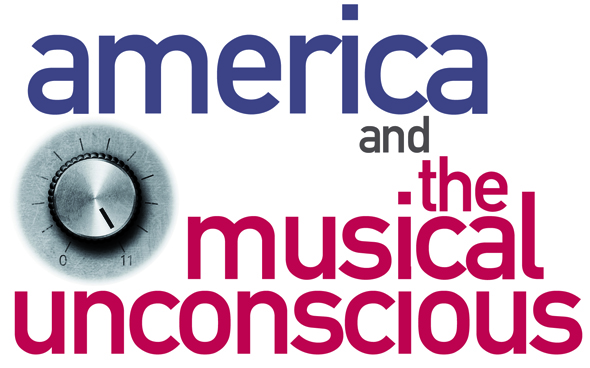
"Music is clearly one of the most important components of American culture, and of postmodernity generally. People are listening to music all the time; it’s a new spatial form they are surrounded with, and I wish I could write about that and music generally."
- Fredric Jameson, Jameson on Jameson. Conversations on Cultural Marxism
When, in 1981, Fredric Jameson forged a new method to analyze cultural texts and objects in terms of what he called “the political unconscious” he focused largely on the political implications of literary artifacts from the realist and modernist periods of especially European descent, to his own regret omitting musical forms of cultural expression. In the thirty-odd years since then, music has doubtlessly gained even more importance in American culture (and American music globally). While the field of American Studies has acknowledged and followed this development in various ways, it nevertheless mostly privileges textual and visual forms of art and thereby often neglects the unique qualities of music with regard to central paradigmatic concerns in the humanities such as space, the body, affect, or cognition. This conference seeks to adjust this imbalance by placing music center stage in American Studies. In doing so, it takes its cue from Jameson and proffers the “musical unconscious” as a general framework of analysis that highlights the convergence of the three dimensions of the individual musical text, the social context, and the technological conditions of possibility or mode of production.
The conference takes place from May 30-31, 2014 at Junior Year in Munich (Richard-Wagner-Straße 27) and is co-organized by the American studies departments of the University of Cologne (Julius Greve / julius.greve@uni-koeln.de) and Ludwig-Maximilians-Universität Munich (Sascha Pöhlmann / poehlmann@lmu.de), in cooperation with Junior Year in Munich. It is open to the public; there is no conference fee.
We have a special treat for music lovers in the evening of May 30. As a conference event, Marc Dorendorf will perform the music of Jimi Hendrix in the very place that Hendrx himself once played in, the legendary Munich venue “Rationaltheater.”
The conference program is available for download here (PDF, 275 kB).
Unpopular Culture (October 31-November 3, 2013, Amerika-Haus Munich)
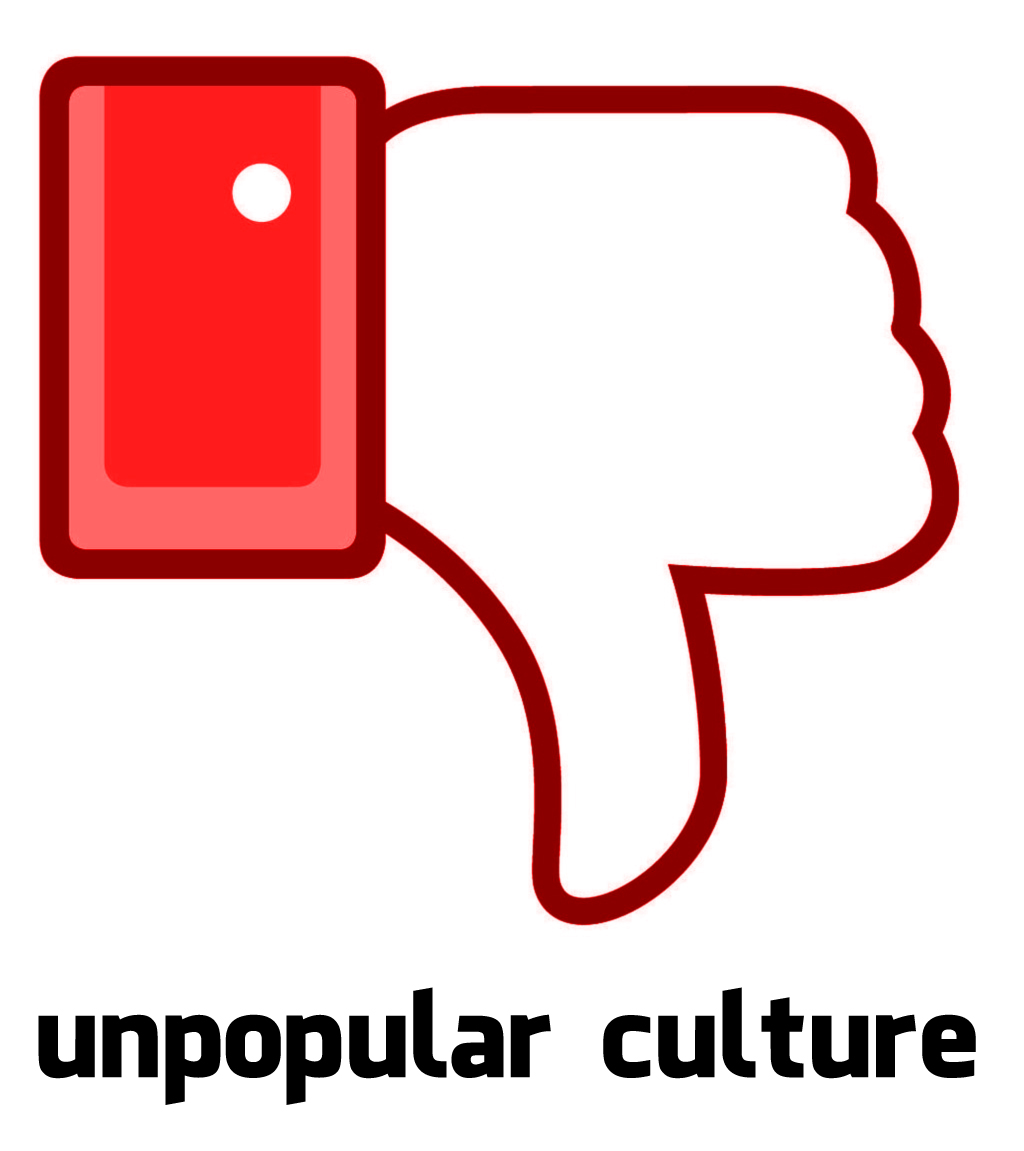
Despite ongoing attempts to cross borders and close gaps, popular culture is still often construed in opposition to high culture in contemporary academic and non-academic discourses. Partly indebted to what could be labeled a 'Birmingham-School-tradition' of the study of the popular, scholars have repeatedly attempted to deconstruct the popular by problematizing various binaries the study of popular culture might summon; especially with regard to processes of identity formation, agency, and political positionalities. Yet the concept of popular culture itself also implies a dichotomy of a very different kind, and this conference seeks to explore the implications of this Other, an excluded middle that seeks to provide a new angle on popular culture: the unpopular. As an adjective, it can be used to describe either popular or high culture (and one might even define high culture by it), depending on one’s ideological perspective, but as a concept it offers a third term that complicates the other two, and that accordingly deserves more critical attention.
The notion of the unpopular is as crucial to an understanding of popular culture as it is marginalized in the discourse on the subject. For example, significant parts of what is classified as popular culture rely on self-definitions of unpopularity, for example “underground” or “independent” movements or subcultures opposed to the “mainstream.” Furthermore, a theory of the unpopular provides a way of analyzing the aesthetic value judgments that are integral to the study of popular culture but are not often made explicit. This conference seeks to explore and theorize the manifold implications of the unpopular from a variety of different angles, for example addressing questions such as:
- How does unpopularity come about? How is it constructed and defined, how are such constructions maintained, and by whom?
- How do the mechanisms of the unpopular change in time? What histories of the unpopular could we tell?
- How does unpopularity relate to popular and high culture? Can there even be such a thing as unpopular culture, or is the unpopular at odds with culture itself? Is the unpopular rather a mark of high culture than popular culture, or vice versa?
- What are the politics of the unpopular? What is its importance as a category of inclusion and exclusion, for 'subcultures' and 'the mainstream'?
- How do particular cultural artifacts represent unpopularity, and to what end? Can we describe an aesthetics of the unpopular?
- What particular fields of popular and high culture distance themselves from or embrace the unpopular?
- How do particular cultural artifacts themselves become unpopular, and why? How is the unpopular related to value judgments such as 'offensive,' 'controversial,' 'cool,' 'ugly,' '(un)fashionable,' or 'bad'?
The conference is of course open to the public; all are welcome. There is no conference fee.
The conference program is available for download here (PDF, 438 kB).
Organizers: Martin Lüthe (John F. Kennedy Institute, Berlin) & Sascha Pöhlmann (LMU Munich)
American Media—European Cultures: Negotiations of Transnational Exchange (October 10-12, 2013)
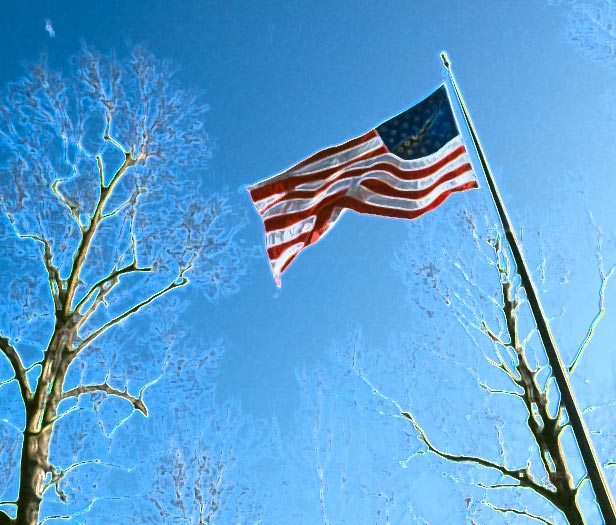
In the course of the 20th and 21st Centuries contact zones between American media communication and European cultures have multiplied. Shaped initially by the competition among the early film industries located in France, Italy, and the United States and continuing with today’s global dominance of web-based companies such as Google or Facebook, these contact zones are made up of complex economic, aesthetic, and cultural negotiations. American media productions setting the standard for popular forms of storytelling and entertainment have become the benchmark against which local European productions have to compete. Yet the dynamic and scope of these negotiations has been ambiguous, ranging from instances of American cultural imperialism to the subversion of rigid social hierarchies in Europe via American cultural productions. More often than not they have revolved around the transatlantic exchange of creative ideas and the cross-fertilization of media and art movements. This conference pursues various arenas of transnational cultural exchange including photography, film, fashion, television, and the new media, by asking not merely how American media productions were translated into different European cultural contexts but how they shaped the idea of distinct yet interconnected European identities.
Speakers: Astrid Böger (Hamburg), Christof Decker (Munich), Celestino Deleyto (Zaragoza), Hilaria Loyo (Zaragoza), Frank Mehring (Nijmegen), Gilles Menegaldo (Poitiers), Agnieszka Soltysik Monnet (Lausanne), Ralph J. Poole (Salzburg), Tomáš Pospíšil (Masaryk U), Philip Schlesinger (Glasgow), Anneke Smelik (Nijmegen), Melvyn Stokes (London), Juan A. Suárez (Murcia), William Uricchio (MIT)
Opening Address: Udo Hebel (German Association for American Studies/Regensburg)
The program can be found here.
More information on the participants can be found here.
Venue: Amerika-Institut, Schellingstrasse 3, Front Building, Room 201
No conference fee, the conference is open to the public.
Organizers: Christof Decker (Munich) and Astrid Böger (Hamburg)
The Art of Walking: Pedestrian Mobility in Literature, Philosophy, and the Arts from the 18th Century to the 21st (Ecole Normale Supérieure de Lyon, October 10-12, 2013)

Organizers: Klaus Benesch (LMU Munich) and François Specq (Ecole Normale Supérieure de Lyon, CNRS LIRE)
Walking is one of man’s fundamental modes of relating to the environment, of creating a sense of place and space. In the modern period, this human practice has also become a literary topic, a genre or mode of writing as much as a form of movement in space. Hence it can be said to represent a twofold mediation between man and the world at large: the corporeal movement in space and time, and the reflections of that movement in literature and the arts. It is from this double perspective that we seek to explore how walking has been turned into both an aesthetic project and a form of ‘mobile’ thinking, from John Gay to Paul Auster, from Wordsworth and Thoreau to Harriet Tarlo and Richard Long, from Rousseau to Rimbaud and André Breton.
We are looking for papers that engage the conceptual, cultural, textual, and visual dimensions of walking. Contributions may deal with how walking has become an aesthetic program, a form of reflection or a complex, frequently ambivalent metaphor; they may also discuss walking in light of its historical, ideological, aesthetic, philosophical, and poetical implications, or investigate two or more of these aspects jointly. Or they may ask, how one can delineate the semantic field of ‘walking,’ which may evoke, among others, the notion of ‘rambling,’ ‘sauntering,’ ‘roaming,’ ‘hiking,’ or ‘perambulating,’ but also of the Aristotelian ‘peripatetic’ and, following Baudelaire and Walter Benjamin, of the “flâneur”? What are the values attached to these practices? How does walking enhance our knowledge of a specific place or environment? Are there differences between walking in ‘nature’ and walking in an urban environment? To what extent has walking reinforced or, perhaps, questioned the distinction between the rural and the urban? If major texts in this tradition, such as Rousseau’s Reveries of a Solitary Walker and Wordsworth’s The Excursion, focus on the countryside, walking is not only, nor even primarily, a rural phenomenon, but is also typical of urban modernity. How has walking as a literary genre evolved throughout the modern period, and, how, following its heyday during the Romantic period, has it been redefined in connection to modernist issues? To what extent does the aesthetics of the ordinary and of chance, which seem to be associated with walking, relate to aspects of postmodern nomadology? Is walking gendered?
We also encourage approaches that are not limited to either cultural or literary history, but conjoin poetological, phenomenological, and philosophical aspects of walking. Put another way, while analyzing representations and practices of walking, we are equally interested to study instances of (inter)textuality and cross-disciplinary fertilization. For example, how is the activity of walking related to literary genres: are aesthetic depictions or representations of walking intrinsically narrative or poetical? The various links between walking and writing or reading, the connection between walking and creativity, or the diverse ‘textual transcriptions’ of walking might also be considered. Furthermore, we find that the complex temporality of walking, next to its relation to space, is also crucial. This temporality is usually marked by an ‘intensified’ temporal awareness, which is antithetical to the modern emphasis on speed as a symbol of modernity, and which privileges a sense of place over that of space. One may also think of the connection or analogy between the rhythm of walking and that of a poetic text (as in the notion of ‘foot,’ which has traditionally been the basic unit of poetic scansion). In all of these different senses, walking encapsulates both the physical and spiritual dimensions of human existence; it thus turns into an important cultural symbol, a site where the outside world meets with the intimate realm of human reflection and creativity.
Workshop: Cultures of Privacy (June 29, 2013)
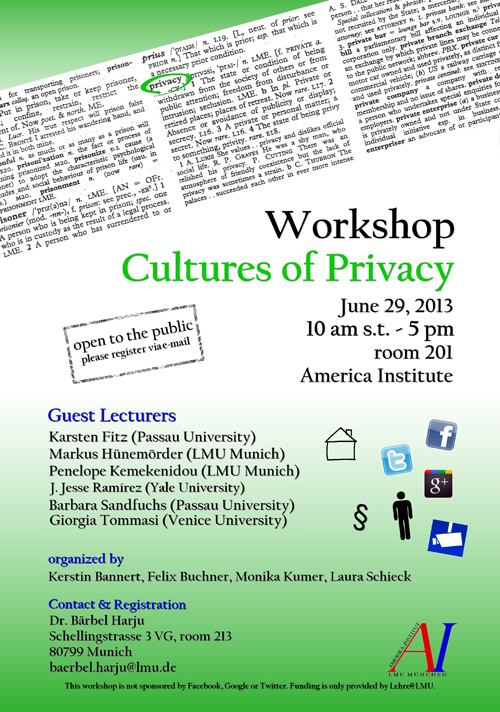
The student-organized workshop “Cultures of Privacy” will take place at the Amerika-Institut on Saturday, June 29. Guest speakers from Yale University, Ca’Foscari University of Venice, the University of Passau and LMU Munich will discuss a number of privacy issues in U.S. culture: We’re looking forward to learning about the Obamas’ staging of privacy, debates about gossip, technology and privacy concerns, privacy in U.S constitutional law and more. The workshop is open to the public, so feel free to join us. Please register via email: baerbel.harju@lmu.de
Workshop “Cultures of Privacy”, June 29, 2013, 10 am s.t. – 5 pm, Schellingstraße 3 VG, room 201.
The Aesthetics of Privacy: Reading and Writing Under Conditions of Modernity
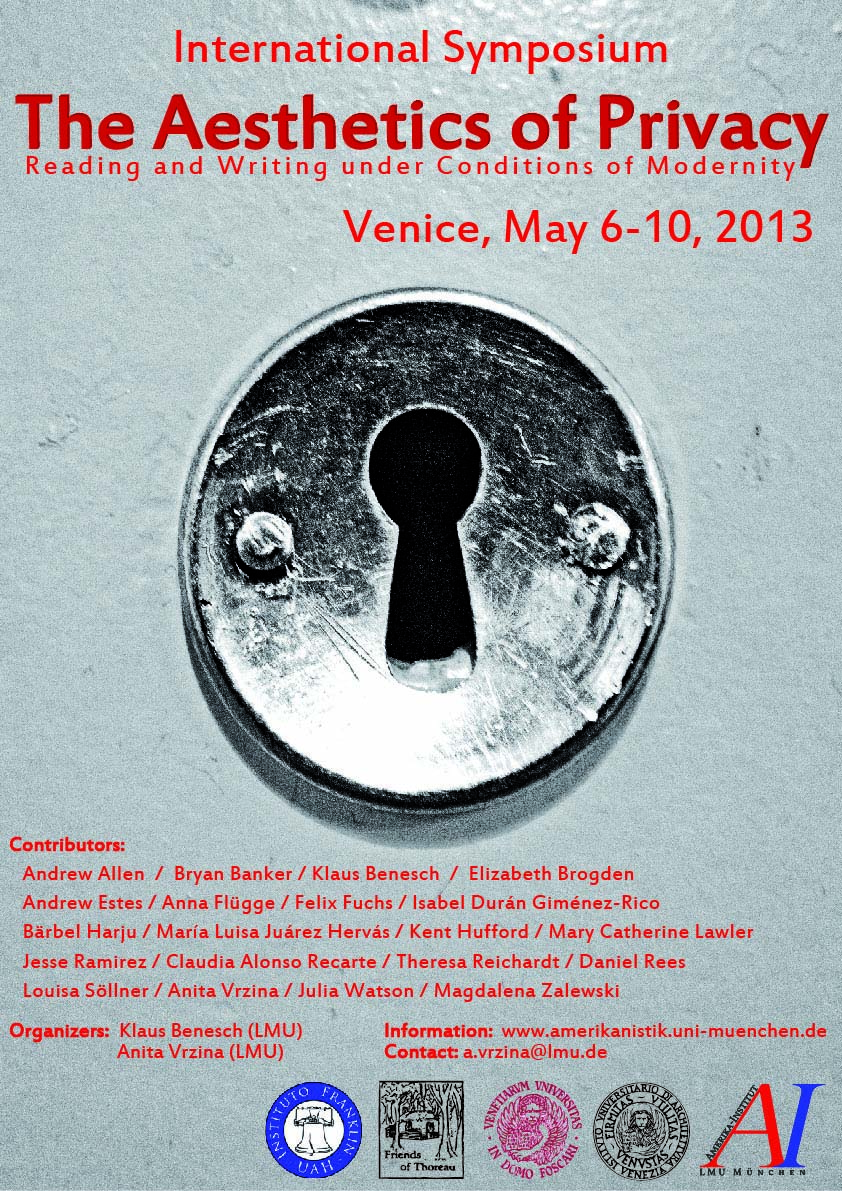 Both writing and reading have frequently been associated with social and spatial isolation: one writes (and reads) at home, in the privacy of a study, a bedroom, an attic -- in any case, a space set apart from public attention and social interaction. Though shot through with ideas and themes that originated in public discourses (i.e. 'out there'), the production of art - particularly written art, poetry, novels, essays, journals etc. - for long remained a quintessentially private enterprise. Some writers even believed that the 'privacy' of writerly discourse is severely threatened by the act of publication itself, the making public and available of the results of a writer's work. Emily Dickinson, in her poem "Publication--the Auction," famously dismissed publication as "the auction of the mind of man," because writing or composing a poem to her seemed a fundamentally private affaire, one that unfolds from the privacy of the home. For Dickinson the public aspects of writing, its publication and 'partition' (to use Rancière's terminology) among larger audiences, corrupts the act of composition and ultimately distracts the writer's attention away from his/her subject.
Both writing and reading have frequently been associated with social and spatial isolation: one writes (and reads) at home, in the privacy of a study, a bedroom, an attic -- in any case, a space set apart from public attention and social interaction. Though shot through with ideas and themes that originated in public discourses (i.e. 'out there'), the production of art - particularly written art, poetry, novels, essays, journals etc. - for long remained a quintessentially private enterprise. Some writers even believed that the 'privacy' of writerly discourse is severely threatened by the act of publication itself, the making public and available of the results of a writer's work. Emily Dickinson, in her poem "Publication--the Auction," famously dismissed publication as "the auction of the mind of man," because writing or composing a poem to her seemed a fundamentally private affaire, one that unfolds from the privacy of the home. For Dickinson the public aspects of writing, its publication and 'partition' (to use Rancière's terminology) among larger audiences, corrupts the act of composition and ultimately distracts the writer's attention away from his/her subject.
The idea of an intense 'private' relationship between writer/reader and text has always been one of the great myths of Western literary cultures. There's little doubt that one never writes (or reads for that matter) from scratch: our compositions and the way we make sense of any text is heavily determined by what we know and by our socio-cultural surroundings. To read and write means to participate in specific cultural discourses, to reproduce and, at best, to add to these discourses as they unfold from a particular time and (market-) place. Writing and reading are thus fundamentally social activities yet they thrive, quite paradoxically, on the belief that they are pursued individually and independently of the social context. In our symposium we will investigate--by looking at selected key texts and criticism--the history and theory of the private-public conditions of literature throughout the modern age; we will also trace some of the consequences of mass media and global electronic networks regarding the alleged 'privacy' of writing/reading. We will ask about the changing role of literature today, in an age of crowd-sourcing and free electronic publishing outlets; and we will explore the limits of the freedom of writing (and reading) when both skills increasingly come to the fore of the social arena ('out of the closet' so-to-speak), and are incorporated into the global marketplace. Finally, we'll look at culturally specific manifestations of the aesthetics of privacy, by juxtaposing concepts of art and privacy both in American mainstream culture and in the context of minorities, such as African Americans and other ethnic groups.
The symposium is designed as a follow up to our 2012 seminar “The Politics of Aesthetics” which focused on the work of French philosopher Jacques Rancière and it will pick up on some of the Rancière's ideas and terminology.
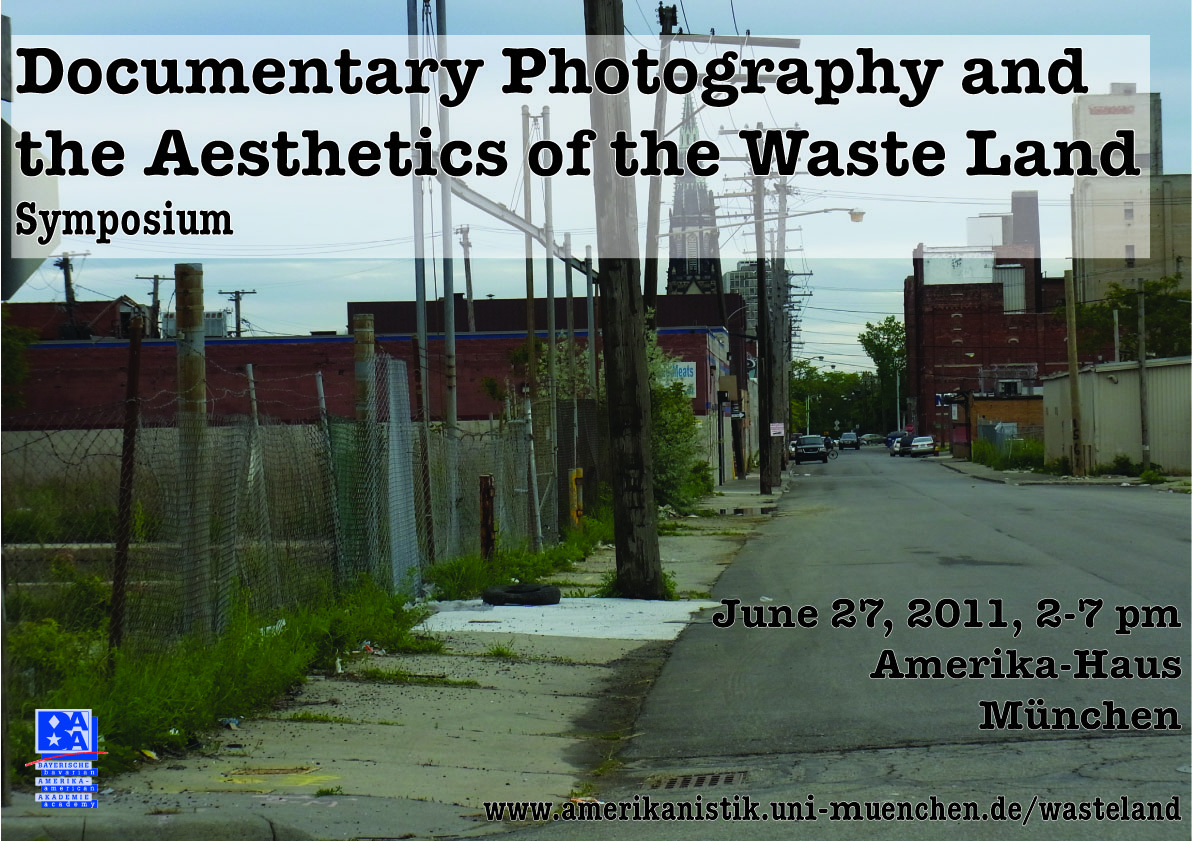
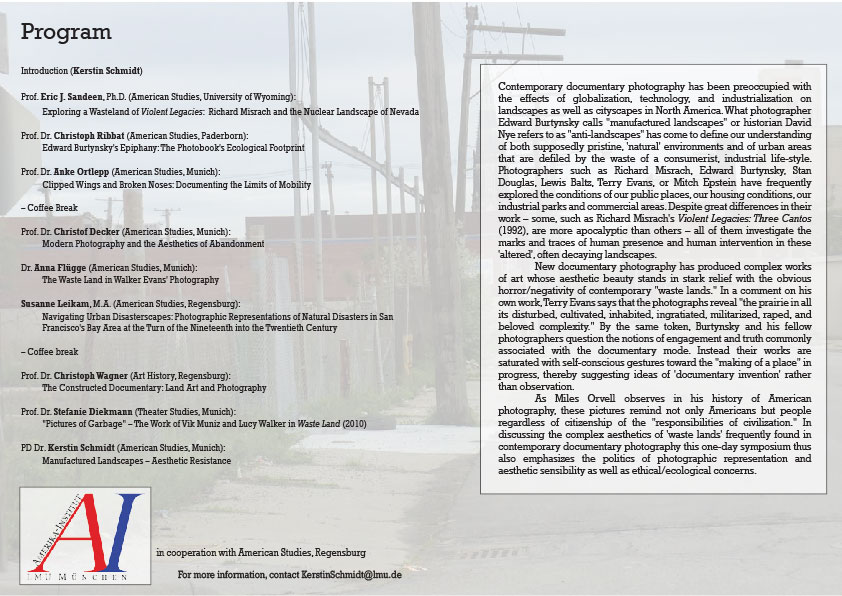 The program is available for download here.
The program is available for download here.
For more information on the conference, please contact KerstinSchmidt@lmu.de.
Coming Together or Coming Apart? Europe and the United States in the Sixties
(Berlin, September 12-24, 2011)
 (Haight-Ashbury, San Francisco. Image by Sascha Pöhlmann under a CC BY-NC-SA 3.0 license.)
(Haight-Ashbury, San Francisco. Image by Sascha Pöhlmann under a CC BY-NC-SA 3.0 license.)
The 1960s are well known as one of the most eventful and turbulent decades in the history of the United States and Europe. In this two-week intensive seminar we want to engage in a comparative analysis of the different social, cultural and political dynamics of the Sixties not only within different countries in Europe and in the USA, but also regarding transnational and transatlantic political relationships as well as cultural developments.
Lecturers and students from the fields of history, political science, literature, art, and cultural studies from Germany, France, Great Britain, Denmark, Italy, and Poland will explore the most important social protest movements as well as literary, cultural, and political developments of this decade together. Among these will be, for example, the black civil rights movement, the women’s rights movement and the anti-war movement, music and film, the Cold War, the rise of postmodernism in literature and the impact of new information technologies. Based on an in-depth interdisciplinary discussion and analysis of primary and secondary sources the goal will be to come to a deeper understanding of the intercultural confluences of this era and the effects they had on a national and global level, especially regarding the interconnectedness of many social and cultural movements, and the transnational collaboration of pro- and anti-government groups based in different European countries and the United States.
This Intensive Program is part of an EU project to promote international academic cooperation. The course will count as an advanced level (3rd year) BA-seminar or as a graduate seminar (MA-level) with 15 ECTS credits. It is fully funded by the EU and the grant we have been awarded will cover most of the expenses for travel, room and board of all participating students and faculty.
The Conference Program is available for download here
Thinking Architecture Technology Culture: A Conversation
June 10-11, 2011, Amerika-Haus München
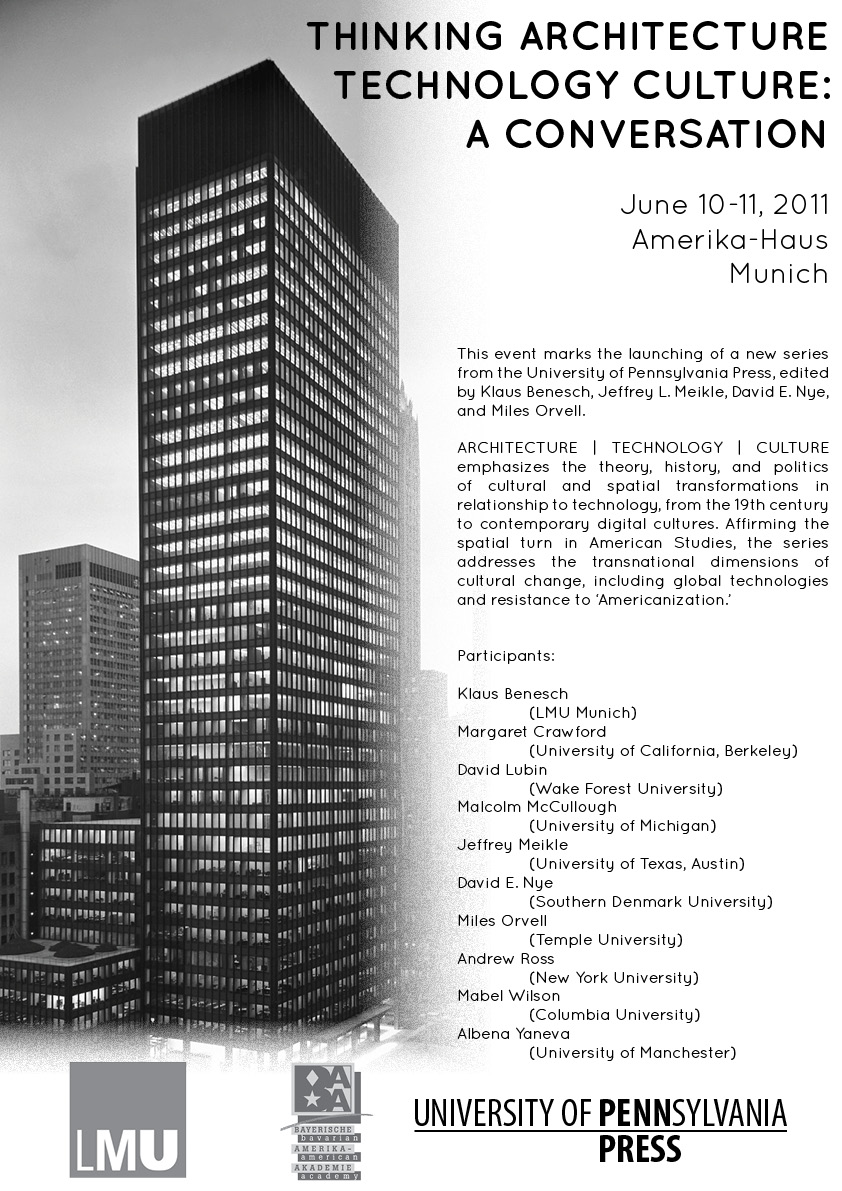
This event marks the launching of a new series from the University of Pennsylvania Press, edited by Klaus Benesch, Jeffrey L. Meikle, David E. Nye, and Miles Orvell.
ARCHITECTURE | TECHNOLOGY | CULTURE emphasizes the theory, history, and politics of cultural and spatial transformations in relationship to technology, from the 19th century to contemporary digital cultures. Affirming the spatial turn in American Studies, the series addresses the transnational dimensions of cultural change, including global technologies and resistance to ‘Americanization.’
The program is available for download.
Revolutionary Leaves: The Fiction of Mark Z. Danielewski
Conference organized by Junior Year in Munich and the Amerika-Institut of LMU Munich
May 20-21, 2011
This two-day event marked the fifth anniversary of the publication of Only Revolutions, Mark Z. Danielewski’s second novel. Danielewski was already hailed as one the most innovative and exciting writers of experimental fiction after his debut House of Leaves was published in 2000, and Only Revolutions - as well as his 2005 novella The Fifty Year Sword - impressively confirmed this assessment. Danielewski is a favourite of literary critics as well as of very devoted fans around the globe, but so far no academic conference had yet been devoted exclusively to his works. Revolutionary Leaves aimed to provide precisely such a forum for discussion without setting the papers any topical limits so as to do justice to the wide-ranging scope of Danielewski’s texts and the complexity of their contexts. Besides the academic section, the conference also included a discussion and workshop with Gerhard Falkner, who is co-translating Only Revolutions into German (with Nora Matocza-Falkner). The conference program is available for download.
Contact: ![]() poehlmann@lmu.de (Dr. Sascha Pöhlmann)
poehlmann@lmu.de (Dr. Sascha Pöhlmann)
Imaging Blackness: Visuality, Liberation, and the Post-Racial in African-American Cultural Politics
July 21, 2012
Contact: Christof Decker (decker@lmu.de)
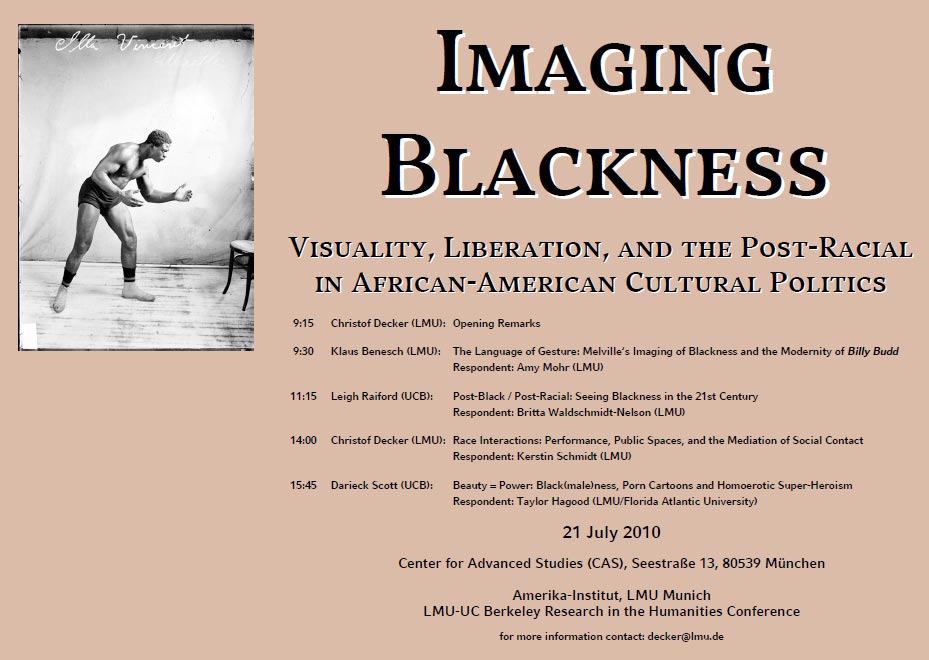
Green Cultures: Environmental Knowledge, Climate, and Catastrophe
Annual conference of the Bavarian American Academy, in cooperation with the Rachel Carson Center
July 9-10, 2010
For program details, click here.

The Amerika-Institut was host to the postgraduate forum from October 30 through November 1, 2009. The three-day conference was organized by Torsten Kathke and Sascha Pöhlmann with generous support by the German Association for American Studies. It offered young scholars in the field of American Studies a forum to present and discuss their current research projects, for example dissertations, essay projects, or Habilitationsschriften.
The program is available for download (PDF, 1,7 Mb).
If you have any questions, just send us an e-mail to info@pgf09.de.
Against the Grain: Reading Pynchon’s Counternarratives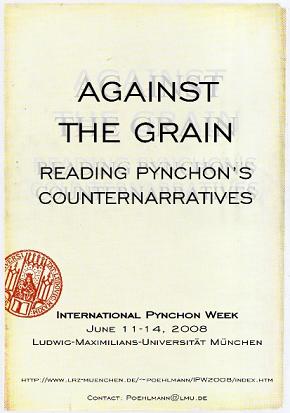
International Pynchon Week 2008
June 11-14
Ludwig-Maximilians-Universität, Munich, Germany
Organisation: Sascha Pöhlmann
What better place to discuss Pynchon’s new novel Against the Day (and all his other texts) than in the Zone? In 2008, the biannual Pynchon conference takes place in Munich, Germany, just as Mondaugen’s city celebrates its 850th birthday (and Europe goes soccer-crazy during the European Cup). We invite scholars and students, amateurs and novices, fans and critics to get together for this four-day event. While a good share of the conference is to be dedicated to Against the Day, it is of course open to all things Pynchon, and all proposals are welcome. A special invitation goes out to scholars from disciplines other than literary studies.
The Idea of the West: Polarities
(Michael Hochgeschwender, Michael Kimmage and Christof Mauch)
February 29, 2008
Amerika Haus, Munich
Program(PDF, 10 kB)
Uncertain Environments: Natural Hazards, Risk, and Insurance in Historical Perspective
September 13 - 15, 2007. Conference at the German Historical Institute, Washington, DC organized by Uwe Lübken, Washington DC and Christof Mauch, LMU.
For more information see www.ghi-dc.org/events/conferences/2007/hazards/hazards_old.html
BAA Summer Institute
July 25 - 27, 2007
Amerika Haus, Munich.
Organisation: Klaus Benesch, LMU
For more information, see the BAA website.
You can also download the flyer (PDF, 24 kb).
Scientific Cultures - Technological Challenges: A Transatlantic Perspective
9. Akademiekonferenz der Bayerischen Amerika-Akademie 2007
June 14 - 16, 2007
Amerika Haus, Munich.
Organisation: Klaus Benesch, LMU
For more information, see the BAA website.
You can also download the conference flyer (PDF, 542 kb).


